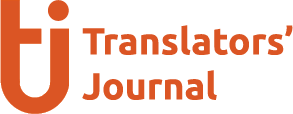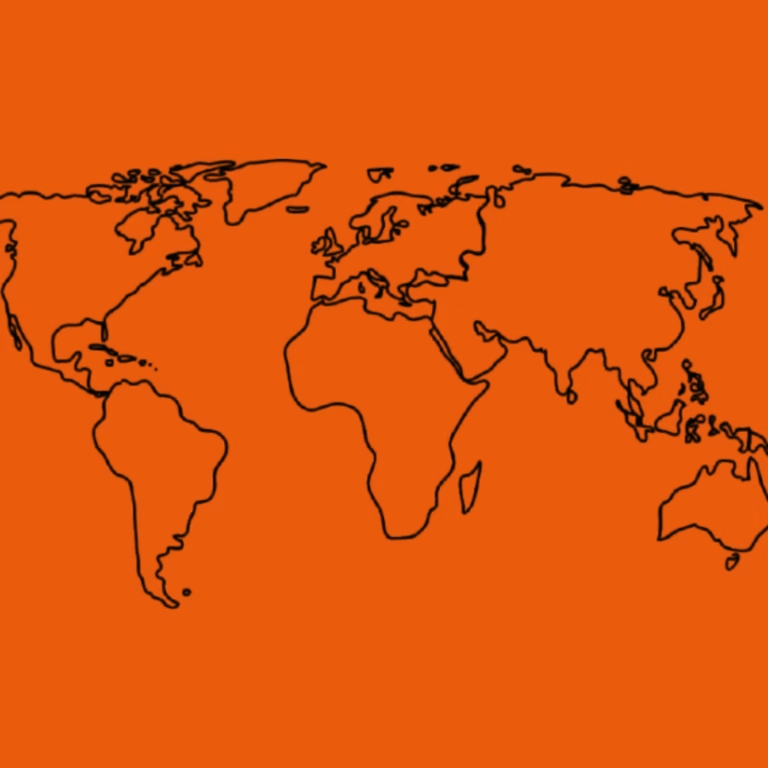
Struggling to find your niche as a freelance translator? You’re not alone. In a global market with over 1M working translators, specializing can be the key to higher pay, better clients, and long-term success.
Should you translate legal documents, medical reports, or technical manuals? Or should you take any job that comes your way?
You don’t have to specialize, but choosing a specific area can help you find better-paying jobs and regular clients. This guide will help you pick the right specialization by matching your skills with market demand.
Let’s dive in!
Is It Necessary to Choose a Specialization?
Specializing in one area isn’t required, but it can boost your career. General translators work across many subjects, while specialists focus on one, which makes them more appealing to clients who need expert knowledge. Specialization often leads to higher pay and more job offers.
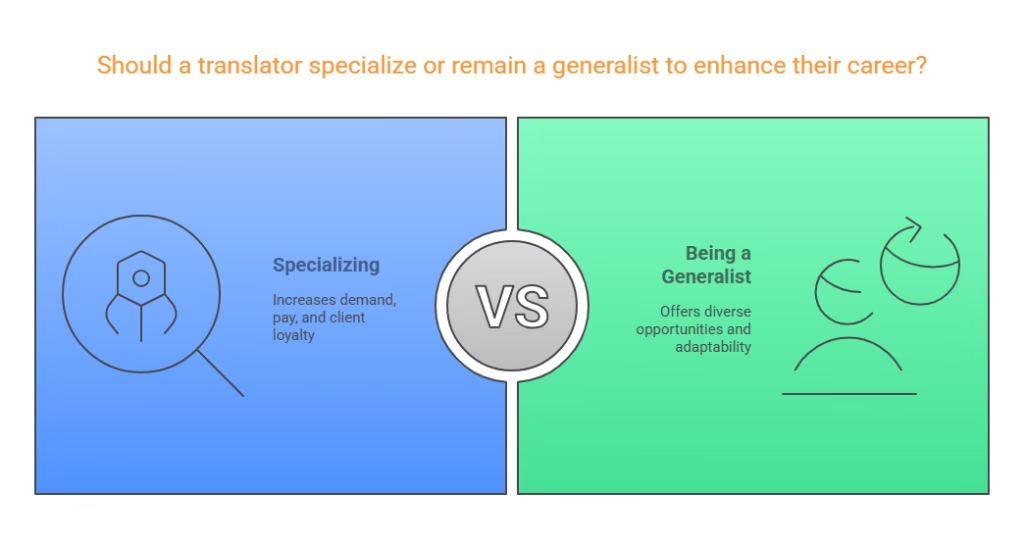
Why Translation Specialization Matters for Career Growth
When you specialize, you stand out in a crowded market. Clients trust specialists more because they know the translator understands specific terms and concepts. With specialization, you’re more likely to find high-paying work and build a stable client base.
The Benefits of Specializing vs. Being a Generalist
- Higher Demand: Specialized translators are in demand in industries with specific needs, like law and medicine.
- Better Pay: Expertise in a niche lets you charge more.
- Consistent Work: Specializing helps you develop long-term relationships with clients, leading to repeat work.
- Less Competition: Niche fields usually have fewer translators, making it easier to find clients.
How Specialization Helps Increase Your Marketability and Client Base
When you become an expert in one area, you make yourself the go-to translator for that field. This targeted approach helps you market your services, charge higher rates, and secure repeat clients.
Assessing Your Skills and Interests
Pick a specialization that matches your strengths so you stay motivated and do your best work. To choose the right specialization, ask yourself:
- What’s your education background? Do you have formal training in a specific field (e.g., law, medicine)?
- Do you have work experience? Have you worked in an industry that requires specialized knowledge?
- What are your passions? Are there fields you enjoy enough to learn their terminology?
- Can you handle complex texts? Are you comfortable translating difficult materials in this field?
Does Your Shortlisted Specialization Have Market Demand?
Before committing, research whether there’s enough demand for your chosen field. Here’s how:
- Check industry trends by reading reports on the translation market.
- Look at job listings to see what types of specialized jobs are being posted.
- Join professional forums to see what fields are growing.
- Check the competition to ensure the field isn’t too crowded unless you have a unique skill.
Some popular specializations include:
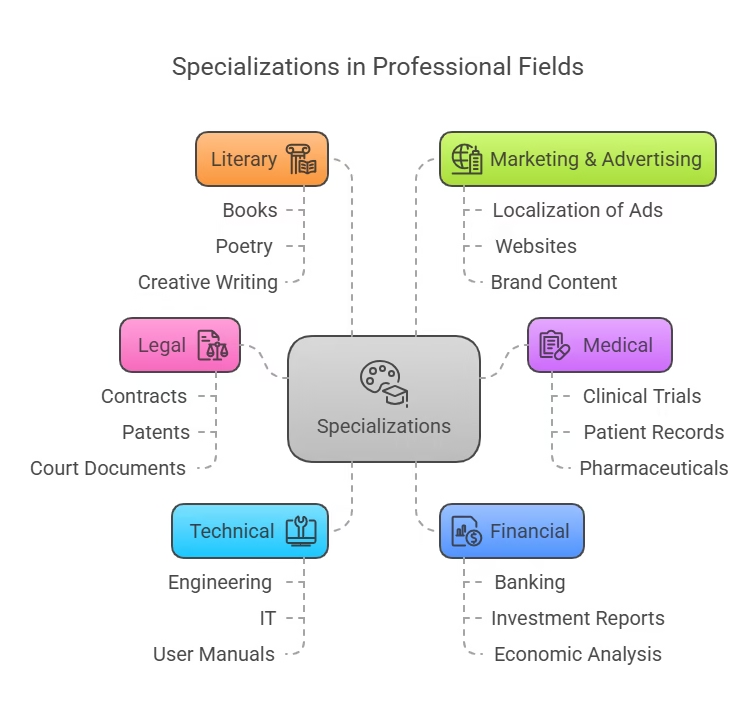
- Legal: Contracts, patents, court documents
- Medical: Clinical trials, patient records, pharmaceuticals
- Technical: Engineering, IT, user manuals
- Financial: Banking, investment reports, economic analysis
- Literary: Books, poetry, creative writing
- Marketing & Advertising: Localization of ads, websites, and brand content
Emerging areas, like environmental translation, gaming localization, or blockchain technology, might also offer good opportunities.
How Complex is Your Chosen Specialization?
Not all specializations are easy to break into. If your field is difficult, be prepared to invest in learning and training. Consider:
- How technical is it? Legal and medical fields need in-depth knowledge.
- Do you need special training? Some fields, like medical or legal translation, need certifications.
- Can you handle complex ideas? Some fields require translating highly detailed or technical content.
Does Your Specialization Fit Your Career and Lifestyle?
Pick a specialization that fits your professional goals and lifestyle. Your choice should also match your personal goals:
- Career aspirations: Do you want to work for agencies, corporations, or freelance?
- Work-life balance: Some niches, like legal translation, might require urgent work or long hours.
- Stability vs. variety: Technical or financial translation offers stability, while literary translation is more creative but may not offer steady work.
Beginner-Friendly Specializations
Some areas are great for building a portfolio and transitioning to more specialized fields later. These fields are easier to enter without advanced certifications:
- General Business Translation – Company reports, internal communications, presentations.
- E-commerce & Retail – Product descriptions, customer service materials.
- Tourism & Hospitality – Travel guides, hotel information, restaurant menus.
- Subtitling & Transcription – Media content, online courses, video translations.
How to Learn and Grow in Your Chosen Field
Continuous learning helps you stay competitive. To become an expert, continue learning:
- Take online courses on platforms like Coursera or Udemy.
- Get certifications to boost your credibility.
- Attend webinars and conferences to stay updated on trends.
- Read industry publications to keep up with new developments.
Networking and Building a Reputation
A strong presence increases your visibility and career opportunities. Building a strong professional network helps establish credibility and attract clients:
- Join Professional Associations – ATA, ITI, and other translator networks offer valuable connections.
- Engage in Online Communities – Participate in LinkedIn groups, forums, and industry discussions.
- Showcase Your Expertise – Publish blog posts, case studies, and client testimonials.
- Offer Free Samples – Demonstrate skills to potential clients with sample translations.
Steps to Choose Your First Specialization
Follow these steps to choose your specialization:
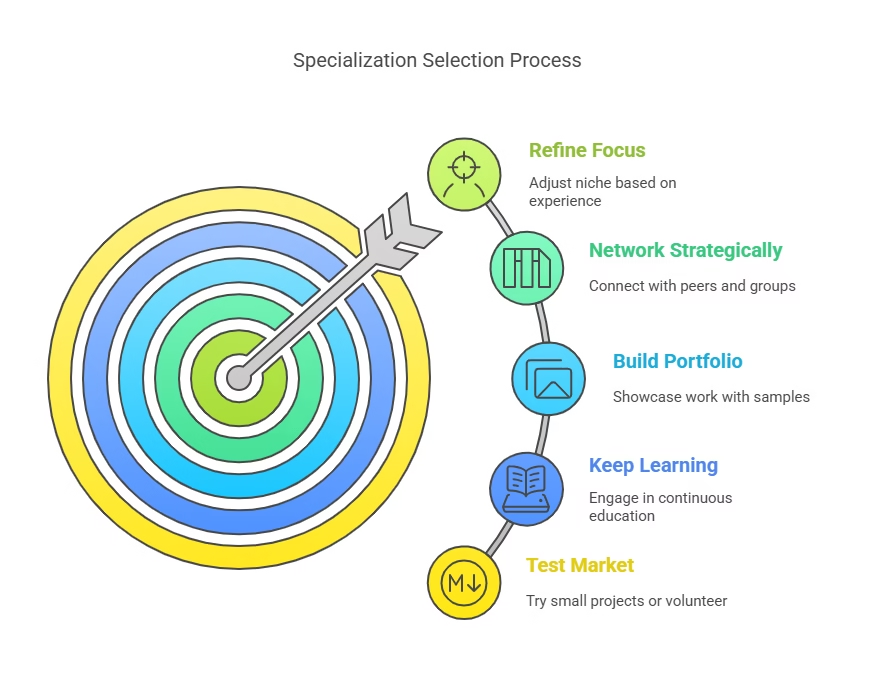
- Assess yourself: Think about your education, work experience, and personal interests.
- Research the market: Look for areas with strong demand and low competition.
- Shortlist options: Pick 2-3 fields that match your skills and interests.
- Evaluate the complexity: Do you need extra training?
- Test the market: Try small projects or volunteer in your chosen field.
- Keep learning: Take courses and read industry materials.
- Build a portfolio: Show your work with sample translations.
- Network strategically: Join professional groups and connect with peers.
- Refine your focus: Based on experience, adjust your niche if needed.
Frequently Asked Questions (FAQ)
1. Why specialize as a translator? Specializing helps you stand out, get higher-paying jobs, and build a stronger client base.
2. How do I know which field is right for me? Think about your interests, education, and language skills. Then research which fields are in high demand.
3. What are the most popular translation specializations? Legal, medical, technical, financial, literary, marketing, and website localization are all common fields.
4. How do I research market demand? Check job boards, talk to other translators, and explore industry trends.
5. Can I change my specialization later? Yes, but it’s best to establish yourself in one field before switching.
6. Do I need certifications? Some fields, like legal and medical translation, require specific credentials.
7. How do I build experience in a new field? Take specialized courses, practice on sample projects, and find volunteer opportunities.
8. How do I market my specialization? Build a strong portfolio, join translation platforms, and optimize your LinkedIn profile to highlight your niche.
9. How do I stay updated? Keep learning by attending courses, webinars, and reading industry news.
10. How do I know if a specialization is too competitive? Research the number of translators in that field and the demand for services.
11. What if I’m unsure which specialization to choose? Try out different fields with small projects to see what excites you.
12. How long does it take to specialize? It can take months or years to become an expert, depending on the field and your commitment.
13. What are good entry-level specializations? Marketing translation, simple legal or financial translations, and subtitling are good starting points.
